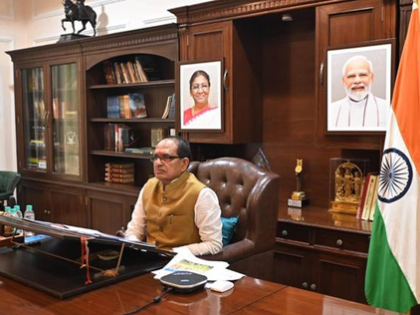Centre to launch nationwide drive for boosting Rabi crop on Oct 3
By IANS | Updated: August 14, 2025 21:05 IST2025-08-14T20:55:36+5:302025-08-14T21:05:09+5:30
New Delhi, Aug 14 Union Agriculture & Farmers’ Welfare Minister Shivraj Singh Chouhan announced on Thursday that the ...

Centre to launch nationwide drive for boosting Rabi crop on Oct 3
New Delhi, Aug 14 Union Agriculture & Farmers’ Welfare Minister Shivraj Singh Chouhan announced on Thursday that the outreach to farmers across India under the Viksit Krishi Sankalp Abhiyan for the upcoming Rabi crop will be launched from October 3 to Dhanteras on October 18.
Addressing a meeting of state Agriculture Ministers here, the minister said a meeting in the run-up to the campaign will be held in the national capital on September 15–16. He urged all his state counterparts to prepare seriously for this initiative, which will reach out to farmers across India through technology dissemination, capacity building, and grassroots engagement to enhance farm production.
Discussions at the meeting covered a wide range of topics such as the shortage of fertilisers and urea, certification of bio-stimulants, the National Mission on Natural Farming, increasing pulses and oilseeds production, the 5-year agricultural action plan, settlement of crop insurance claims in flood and disaster-affected areas, and publicising the toll-free number for resolving farmers’ grievances.
Chouhan also asked the ministers to gather data on fertiliser requirements for the Rabi season and come prepared for an in-depth discussion at the conference.
The meeting also reviewed preparations for the National Mission on Natural Farming, which will be launched by the Prime Minister on August 23. Chouhan directed officials to ensure full readiness to meet the mission’s targets and discussed the progress under the Pradhan Mantri Dhan-Dhaanya Krishi Yojana in 100 districts.
The minister also deliberated on increasing the production of pulses and oilseeds, and urged State Agriculture Ministers to personally lead and promote these important missions, schemes, and campaigns in their states. He stressed that the country must strengthen the production of pulses and oilseeds to meet our national demand.
Raising the issue of fake fertilisers and urea once again, Chouhan called upon state governments to take strict action in such cases. He noted that around 30,000 bio-stimulant products were being sold earlier, many without proper certification. So far, only 600 bio-stimulants have been certified. He directed officials to ensure that only these certified products reach farmers, and stressed that forcing farmers to purchase other products along with fertilisers is wrong and that stringent action should be taken against it.
Agriculture Ministers of Rajasthan, Uttar Pradesh, Madhya Pradesh, Bihar, Karnataka, Uttarakhand, Chhattisgarh, as well as representatives from Gujarat and Punjab attended the meeting.
Chouhan said if the demand is genuinely for farming needs, urea will certainly be supplied — the ministry is working promptly on this. However, if there is any suspicion of misuse, it will be seen as a serious matter that will invite strict action. He urged all state Agriculture Ministers to ensure proper use of urea by forming monitoring committees and strengthening oversight mechanisms.
The minister also instructed officials to prepare the outline for a 5-year agricultural action plan by incorporating suggestions from progressive farmers, experts, and other stakeholders. He also directed wider publicising of the ministry’s toll-free number for resolving public welfare issues.
On the Pradhan Mantri Fasal Bima Yojana, Chouhan emphasised that the government is committed to ensuring complete transparency in its implementation. Compensation is being directly transferred to farmers’ accounts through digital payment. If any insurance company or state government delays claim settlement, an additional 12 per cent interest will have to be paid directly to farmers’ accounts.
Disclaimer: This post has been auto-published from an agency feed without any modifications to the text and has not been reviewed by an editor
Open in app